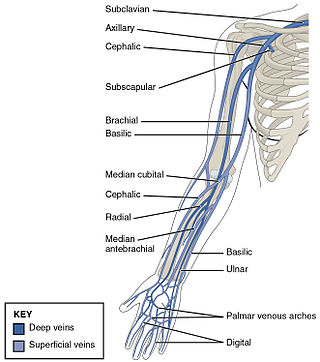Top Qs
Timeline
Chat
Perspective
Cephalic vein
Large blood vessel in the arm From Wikipedia, the free encyclopedia
Remove ads
In human anatomy, the cephalic vein (also called the antecubital vein)[1] is a superficial vein in the arm. It is the longest vein of the upper limb. It starts at the anatomical snuffbox from the radial end of the dorsal venous network of hand, and ascends along the radial (lateral) side of the arm before emptying into the axillary vein. At the elbow, it communicates with the basilic vein via the median cubital vein.
Remove ads
Anatomy
The cephalic vein is situated within the superficial fascia along the anterolateral surface of the biceps.[citation needed]
Origin
The cephalic vein forms at the roof of the anatomical snuffbox at the radial end of the dorsal venous network of hand.[2]: 983
Course and relations
From its origin, it ascends up the lateral aspect of the radius.[3]
Near the shoulder, the cephalic vein passes between the deltoid and pectoralis major muscles (deltopectoral groove) through the clavipectoral triangle, where it empties into the axillary vein.[4]
Anastomoses
It communicates with the basilic vein via the median cubital vein at the elbow.[citation needed]
Remove ads
Clinical significance
The cephalic vein is often visible through the skin, and its location in the deltopectoral groove is fairly consistent, making this site a good candidate for venous access. Permanent pacemaker leads are often placed in the cephalic vein in the deltopectoral groove. The vein may be used for intravenous access, as large bore cannula may be easily placed. However, the cannulation of a vein as close to the radial nerve as the cephalic vein can sometimes lead to nerve damage.[medical citation needed]
Remove ads
History
Ordinarily the term cephalic refers to anatomy of the head. When the Persian Muslim physician Ibn Sīnā's Canon was translated into medieval Latin, cephalic was mistakenly chosen to render the Arabic term al-kífal, meaning "outer". In other words, there was a mistranslation, where "cephalic" was incorrectly used to represent the term "al-kífal."[5][6]
Additional images
- Cross-section through the middle of the forearm
- The deep veins of the upper extremity
- Cross-section through the middle of upper arm
(cephalic vein labeled at upper left) - Cephalic vein
- Cephalic vein
See also
References
External links
Wikiwand - on
Seamless Wikipedia browsing. On steroids.
Remove ads







